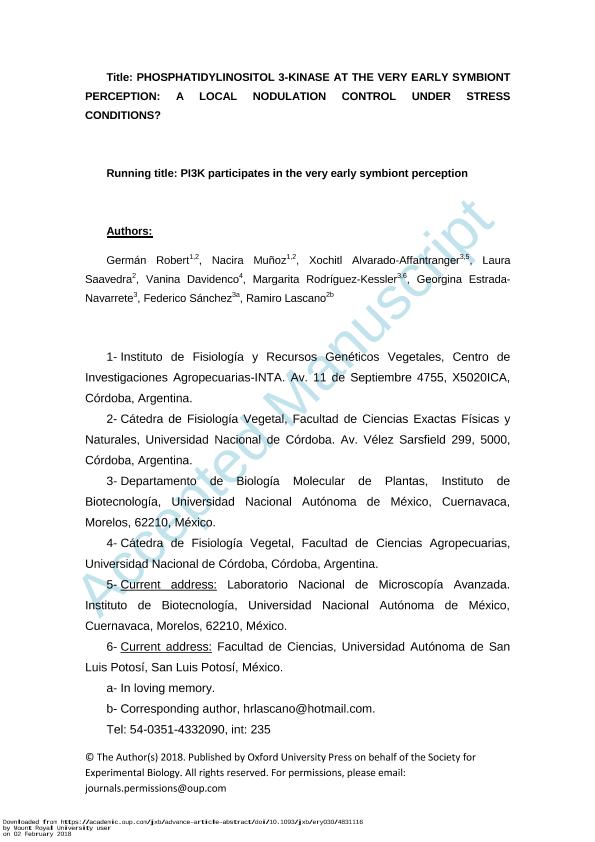Artículo
Phosphatidylinositol 3-kinase function at very early symbiont perception: A local nodulation control under stress conditions?
Robert, Germán ; Muñoz, Nacira Belén
; Muñoz, Nacira Belén ; Alvarado Affantranger, Xochitl; Saavedra, Laura; Davidenco, Vanina
; Alvarado Affantranger, Xochitl; Saavedra, Laura; Davidenco, Vanina ; Rodríguez y Domínguez Kessler, Margarita; Estrada Navarrete, Georgina; Sanchez, Federico; Lascano, Hernan Ramiro
; Rodríguez y Domínguez Kessler, Margarita; Estrada Navarrete, Georgina; Sanchez, Federico; Lascano, Hernan Ramiro
 ; Muñoz, Nacira Belén
; Muñoz, Nacira Belén ; Alvarado Affantranger, Xochitl; Saavedra, Laura; Davidenco, Vanina
; Alvarado Affantranger, Xochitl; Saavedra, Laura; Davidenco, Vanina ; Rodríguez y Domínguez Kessler, Margarita; Estrada Navarrete, Georgina; Sanchez, Federico; Lascano, Hernan Ramiro
; Rodríguez y Domínguez Kessler, Margarita; Estrada Navarrete, Georgina; Sanchez, Federico; Lascano, Hernan Ramiro
Fecha de publicación:
03/04/2018
Editorial:
Oxford University Press
Revista:
Journal of Experimental Botany
ISSN:
0022-0957
Idioma:
Inglés
Tipo de recurso:
Artículo publicado
Clasificación temática:
Resumen
Root hair curling is an early and essential morphological change required for the success of the symbiotic interaction between legumes and rhizobia. At this stage rhizobia grow as an infection thread within root hairs and are internalized into the plant cells by endocytosis, where the PI3K enzyme plays important roles. Previous observations show that stress conditions affect early stages of the symbiotic interaction, from 2 to 30 min post-inoculation, which we term as very early host responses, and affect symbiosis establishment. Herein, we demonstrated the relevance of the very early host responses for the symbiotic interaction. PI3K and the NADPH oxidase complex are found to have key roles in the microsymbiont recognition response, modulating the apoplastic and intracellular/endosomal ROS induction in root hairs. Interestingly, compared with soybean mutant plants that do not perceive the symbiont, we demonstrated that the very early symbiont perception under sublethal saline stress conditions induced root hair death. Together, these results highlight not only the importance of the very early host-responses on later stages of the symbiont interaction, but also suggest that they act as a mechanism for local control of nodulation capacity, prior to the abortion of the infection thread, preventing the allocation of resources/energy for nodule formation under unfavorable environmental conditions.
Archivos asociados
Licencia
Identificadores
Colecciones
Articulos(CCT - CORDOBA)
Articulos de CTRO.CIENTIFICO TECNOL.CONICET - CORDOBA
Articulos de CTRO.CIENTIFICO TECNOL.CONICET - CORDOBA
Citación
Robert, Germán; Muñoz, Nacira Belén; Alvarado Affantranger, Xochitl; Saavedra, Laura; Davidenco, Vanina; et al.; Phosphatidylinositol 3-kinase function at very early symbiont perception: A local nodulation control under stress conditions?; Oxford University Press; Journal of Experimental Botany; 69; 8; 3-4-2018; 2037-2048
Compartir
Altmétricas



